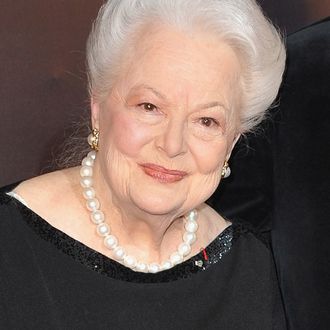
Olivia de Havilland’s long legal battle against FX over her depiction in the Ryan Murphy series Feud: Bette and Joan has ended with a whimper. The U.S. Supreme Court has rejected the 102-year-old classic Hollywood star’s petition to review a California court’s dismissal of her case against the network, according to The Hollywood Reporter. De Havilland initially sued over her right to publicity, according to California law, claiming that Catherine Zeta-Jones’s portrayal of her in the series was in a false light and contrary to the reputation she had built for herself.
Much of the debate came down to whether de Havilland ever would, as she did on Feud, refer to her sister Joan Fontaine as a “bitch” (in real life, she did use the term “dragon lady”). At first, a judge in a Los Angeles court allowed the case to move forward, but it was quickly thrown out by a California appeals court, which argued that de Havilland’s Feud portrayal was “not highly offensive to a reasonable person as a matter of law” and, under the First Amendment, she didn’t have the right to “control, dictate, approve, disapprove, or veto the creator’s portrayal of actual people.” De Havilland also tried to take the case to the California Supreme Court, which turned her down, before attempting to bring it to SCOTUS.
With the Supreme Court passing on reviewing de Havilland’s lawsuit, she is seemingly out of options to proceed. “We and Miss de Havilland are disappointed that the U.S. Supreme Court passed on this opportunity to confirm that the First Amendment does not protect the publication of intentional lies in any medium, including so called docudramas,” de Havilland’s lawyers wrote in a statement. “The California Court of Appeal has turned the First Amendment upside down and without doubt more harm to individuals and public deception will result. One day someone else who is wronged for the sake of Hollywood profits will have the courage to stand on the shoulders of Miss de Havilland and fight for the right to defend a good name and legacy against intentional, unconsented exploitation and falsehoods. Miss de Havilland hopes she will live to see the day when such justice is done.”
The actress, who famously helped break apart aspects of Hollywood’s studio system through legal action in the 1940s, was never thought to have much likelihood of succeeding with her Feud case. If she had, de Havilland would have made it much harder, if not impossible, for docudramas or other Hollywood properties based on living figures to get made without the input of the people they depict. For now, Hollywood’s biopic obsession can live on.


